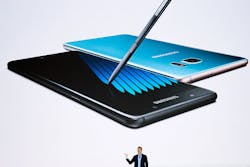Samsung Gears Up for Resilient Return (Yes, Even for the Note)
Remember the Note 7? The high-end smartphone was released last year and was, unfortunately, prone to spontaneous combustion. Samsung Electronics Co. spent more than $5 billion to recall it from the market amid a thunderstorm of customer injuries, airline anxieties and late-night comedy routines.
This summer, the consumer electronics juggernaut did something curious: It refurbished millions of returned phones, added new, apparently safer batteries and reintroduced it as the Note 7 Fan Edition in South Korea. It is actually getting pretty good reviews. And the company plans to sell the Note 7 FE in other Asian countries soon, ahead of the global launch of the Note 8 this fall.
This is roughly akin to Ford coming out with a new hatchback called the Pinto SE or Apple calling the newest version of the iPad the Newton Pro. Only Samsung — methodical, relentless, perhaps unstoppable — can successfully resurrect a brand very recently considered to be a laughingstock.
With my colleagues Sam Kim and Ian King, I traveled around Seoul for a week, visiting Samsung offices and talking to its executives. Consternation over the Note 7 was a major topic of conversation; the company even considered killing the brand during the height of the crisis. “It would be a lie to say that it didn’t cross my mind at all,” said Tae Moon Roh, Samsung’s chief of research and development. “But I think given the lessons of the Note 7 and being aware of what happened last year made us be more committed to making a better product.”
Samsung is in the middle of another kind of firestorm right now. The de facto head of its parent company, the Samsung group, is embroiled in a political scandal and is currently on trial on corruption charges. His father, the chairman of the company, had a heart attack three years ago and hasn’t been seen since. South Koreans are bitterly divided over the company that helped spur the economic development of their country over the last 50 years.
Yet, amid all that sturm und drang, Samsung announced its best earnings ever just last week, recording $12 billion in operating income. Depending on what Apple Inc. reports after the market closes on Tuesday (analysts estimate $10.5 billion in profit), Samsung will likely take the crown as the most profitable company in the world.
While the Note series and Galaxy smartphone series have established Samsung as the major challenger to Apple’s iPhone, what’s really fueling this run at Samsung is the booming business of making semiconductors and display panels. Samsung has already surpassed archrival Intel Corp., despite reporting its own upbeat earnings last week, as the largest maker of semiconductors on the planet.
On our trip to South Korea, we got a glimpse of Samsung’s manufacturing muscle at a massive construction site in Pyeongtaek, about a half hour south of Seoul. Remarkably, Samsung only broke ground on the facility in 2015 and started producing its first chips there in July. It can take other companies three to five years, or even longer, to get new chip plants up and running. (Intel, for example Intel announced plans to build a new fabrication plant in Chandler, Arizona, in 2011. After numerous delays, layoffs and pressure from the Trump administration, it only recently announced a plan to resume work and finish it sometime after 2020.)
The awe-inspiring efficiency of Samsung may not be able to make up for existential threats to the business. Right now, Apple relies on Samsung for components, such as chips and display panels in the iPhone and other devices. This, in turn, makes Samsung reliant on Apple as a dependable buyer of its stockpile, driving revenue and profit. It is in an awkward position to be in with a competitor. (As my Gadfly colleague Tim Culpan noted last week, Samsung may be dangerously reliant on the cyclical business of memory chips.)
But for now, with prices for memory at a high, Samsung looks to have an unassailable advantage. It can use its incredible resources to push its high-end smartphones, and, in the case of the Note 7, even to resurrect them from the dead.
By Brad Stone
About the Author
Bloomberg
Licensed content from Bloomberg, copyright 2016.
